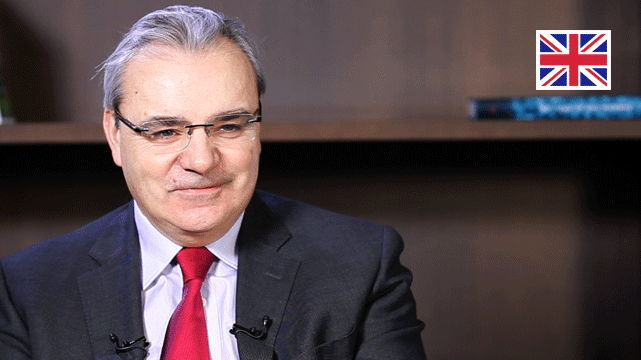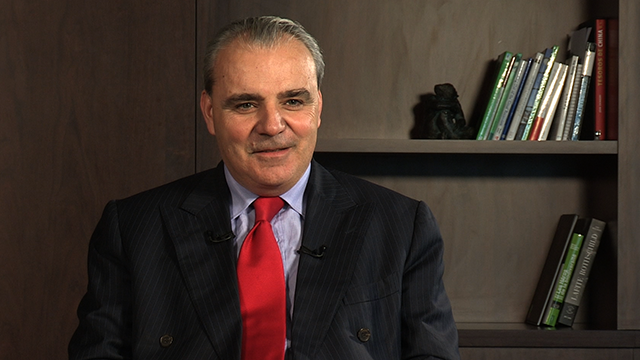EuroBusiness Media (EBM): SUEZ ENVIRONNEMENT, a global leader in water and waste management, reports its 2011 full year results. Jean-Louis Chaussade, welcome. When looking at SUEZ ENVIRONNEMENT’s 2011 performance, it looks like another good set of results, despite some difficulties you had in your Melbourne desalination construction contract. And excluding that, you even exceed your 2011 guidance. So, how did you achieve this performance?
Jean-Louis Chaussade: SUEZ ENVIRONNEMENT’s operating performance was solid in 2011. We achieved a number of industrial and commercial successes. Revenue rose by 6.9% and EBITDA by 7.6% at constant exchange rates, despite a one-off on a contract in Australia.
We maintained our strategy of leadership in environmental performance, we continued to innovate in terms of both technology and contracts, and we made progress on the sustainable development front, rapidly moving towards greater use of recycling and solutions that are more efficient, both in environmental and social terms.
Furthermore, we enhanced productivity and exceeded our cost-reduction target, boosting EBITDA by €130 mn. We kept a strong focus on our financial position: free cash flow increased once again, debt was stable at €7.6 bn, and we maintained our debt to EBITDA ratio at three times since June 2011. Net income was €323 mn, but would have been €560 mn without the additional costs on Melbourne. Revenue, free cash flow, and net debt were above guidance, even with Melbourne. On the EBITDA side, excluding Melbourne, we achieved 15% growth. On the basis of these results and our solid balance sheet, the Board of Directors has approved a dividend of €0.65 per share for 2011. This means a payout rate of close to 100%, and a current dividend yield of between 6 and 7%.
EBM: 2011 was also marked by the Melbourne desalination construction contract that you qualified as a “one-off.” Can we come back on this contract--what happened and where do you stand today?
Jean-Louis Chaussade: The Melbourne contract, that was signed in July 2009 in partnership with Thiess, is a thirty year Construction and Operation contract for a desalination plant producing 450,000 m³ of water per day, with a total revenue of €1.6 bn. This plant will be a worldwide reference in reverse osmosis, a technique in which Degrémont is a leader. In 2011, the State of Victoria was badly hit by cyclone episodes that generated abnormal weather conditions and a tense labour situation in our project, resulting in a low level of workforce productivity and in complementary costs. The project had a negative impact on Group net results of €52 mn in H1 and €185 mn in H2. Since October, the productivity improved thanks to a reinforced supervision, increased shifts, new electrical managers and improved working schedule with a better climate with the unions, after reaching an agreement on extra hours. There is no technical issue and the physical completion is 89% at the end of January. Therefore, the first drop of water production is expected mid-2012 and the finalization is planned for the end of the year.
EBM: There was a lot of news flow on the French water market last year: pressure on prices, European Commission investigation, a trend of municipalization vs. privatization. What was the performance of SUEZ ENVIRONNEMENT water activities?
Jean-Louis Chaussade: In water, we mainly operate in three types of markets: southern Europe, mainly France and Spain, our two European pillars, which generate 25% of our revenue through long-term contracts; the US and Chile, which generate 7% of our revenue, are countries that provide very high visibility and in which we have our own assets and permanent contracts; China, Australia, North Africa and the Middle East, which have strong growth potential. There is also Degrémont, which accounted for 11% of revenue in 2011, and which is a water engineering unit. Overall, in 2011, the revenue of water activities grew by 1,5% at constant Forex and 3,4% excluding Melbourne, and growth was even stronger at EBITDA level.
Our businesses are supported by solid, long-term growth drivers, particularly in wastewater services, and with the development of large cities and areas of water stress. There is strong demand for high-quality water infrastructure and services. Now, coming back to France, yes, the French water market is competitive. SUEZ ENVIRONNEMENT renews approximately 10% of its contracts every year with a high success rate, around 90%. On the remaining 90% of the portfolio, profitability is improving thanks to price growth and efficiency gains. In 2011, Lyonnaise des Eaux successfully renewed most of its contracts that were up for renewal, with satisfactory financial conditions, particularly those in Agde and Tarbes. Prices increased by 2.6% in 2011, and our net trade balance between amendments, contracts gained, and lost and renewed is positive. We won a large number of contracts from our competitors, such as those in Hyères and Angers. We are also very active in the development of new businesses, and in offering innovative solutions to our clients as reflected for example by our new “Contract for Water Health.”
EBM: The other half of SUEZ ENVIRONNEMENT business is the waste activity, which performed well in 2011 with 13% growth in revenue. Can you explain the drivers of this performance?
Jean-Louis Chaussade: In waste, we have a unique European platform and strong positions in growth markets. 11% of our total revenue comes from our European waste sorting and recycling business. These activities are seeing rapid growth, driven by a fundamental trend towards greater material recovery, which itself is the result of ambitious regulatory objectives and the development of the circular economy. The rest of our European waste services and treatment activities account for 32% of revenue. Our unique European platform enables us to take a holistic approach to managing waste flows and to use our treatment facilities more efficiently in order to improve margins.
Internationally, we operate waste activities mainly in Australia and China. We have critical mass in all countries in which we operate. We have leading positions in France, Benelux and Germany, and, since 2011, in Australia. We also have strong positions in the UK, Scandinavia, Poland, China, North Africa and the Middle East.
Overall, in 2011, the revenue of the waste activity grew by 13%. In 2011, we treated 25 mn tons of waste in Europe, 3% more than in 2010. We also benefit from a positive effect of secondary raw materials prices. And our good performance was also driven by our increasing capacities. This strong performance comes from our positioning oriented towards recovery and technological innovation.
EBM: And finally, looking ahead, what are your main targets and outlook for this year, 2012?
Jean-Louis Chaussade: Given our high-potential positions in both water and waste, we are confident about SUEZ ENVIRONNEMENT's outlook. However, the macroeconomic context is weak for 2012, and although the downturn in activity has not yet reached the same proportions as it did in 2009, we are adopting a similar approach. We have already started to re-orient our priorities to favour profitability and a strong balance sheet. Therefore, our targets for 2012, which are based on the assumption of zero GDP growth in Europe, are the following: revenue and EBITDA at least equal to 2011 at constant exchange rates; a further increase in free cash flow. For 2013, we are aiming for EBITDA 8% higher than the 2011 level, that is at least €2.7 bn. Regarding the balance sheet, we are maintaining our target of a net debt to EBITDA ratio of around three times. We will remain selective with our net investments, which will be limited to €1.3 bn in 2012 and 2013. We will maintain an attractive dividend policy with at least €0.65 per share related to 2012. We are therefore aiming to consolidate our performance and to offer a predictable dividend. We are well positioned to take full advantage of market potential in both water and waste, and we anticipate strong demand for private-sector services at each stage of the water and waste cycles.
EBM: Jean-Louis Chaussade, CEO of SUEZ ENVIRONNEMENT, thank you very much.
Jean-Louis Chaussade: Thank you.



